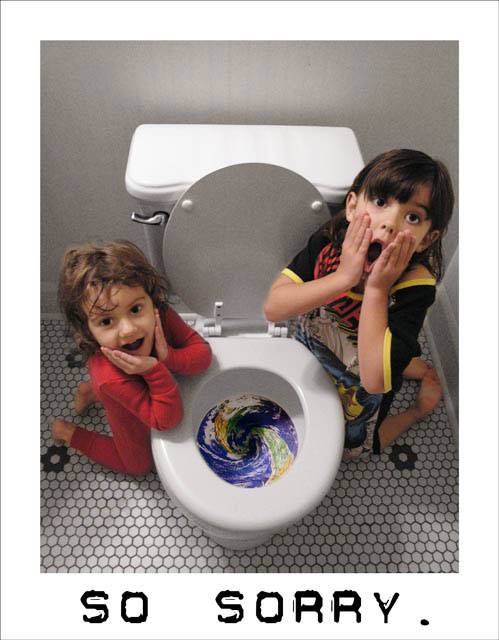America has made a grievous error.
I'm not going to spend much effort analyzing why. As
Matthew Yglesias notes, "these things are multicausal. Elections are complicated." When elections are very close it's easy enough to make the argument that the results hinged on one particular cause (e.g., the Massachusetts gay marriage court decision), but there are dozens of factors that moved significant chunks of votes one way or another. It's simplistic to single out one or two as being crucial.
I was surprised by the result. Nonetheless the best I was hoping for was a 52-47 break for Kerry. Either way we're talking about closely split electorate. A real surprise would have been for either candidate to have a 10 point victory. It's really remarkable how the media pundits imbue the opinions and feelings of what's really a small minority of voters - those voting for the first time, or those who remained on the fence until the end - with so much meaning. Of course they are very important, because they have a great deal to do with the ultimate result. But let us not confuse their decision with the decision of the country at large. An overwhelming majority of Americans voted the way they had planned to vote two years ago, even before we knew who the Democratic nominee would be.
Too much of all that; what now?
In the last several years millions of progressives have made connections through organizations like MoveOn, Democracy for America, and countless other issues oriented groups which have been energized by a commitment to fighting against disturbing trends in our nation's governance. As awful as a continued Bush presidency is likely to be, it does provide a nucleus around which to rally our resolve. Bush may talk about reaching out to those who voted for his opponent, but the fact remains that his agenda for this country remains an anathema to many of us who value economic justice, stewardship of the environment, respect for various cultures, scientific inquiry unburdened by the agenda of profiteers, consumer protection, and world peace.
But let's be honest. Many if not most of Bush's supporters share a large portion of those values, and earnestly believe we are mistaken about how best to get there. If what is heard most from the 'left' is how stupid and ignorant the yahoos that voted for Bush are, then we will marginalize ourselves, and give credence to mockery from the other side. Plenty of intelligent and compassionate people made a weighted decision that the country would be better off with Bush than with Kerry. Plenty of them don't even particularly like Bush. Attacking Bush's supporters is simply counterproductive. Attacking the 'religious right' generically as zealous hypocrites, when they know themselves, and know that
they do care about the less fortunate in our society, and even in poor nations around the world, simply cements their belief that we are the arrogant know-it-alls who don't, in fact, know it all.
What needs to happen instead is to focus investigation on policy and its effect. Bush will be able to enact a great deal of legislation in the next four years which will have deleterious effects on many undeserving victims. We will need to find those stories and tell them, relentlessly. We will be well served to be civil in our discourse, but we need not avoid harshness when it's warranted. And I'm afraid it will be frequently warranted. We need to define our alternative policies and get our representatives to vote for them. Filibusters may be occasionally appropriate, but if they become the order of the day, Democrats will just be seen as obstructionists and lose further ground in Congress in 2006.
It is better to vote against the bad bills and lose, and let the blame rest squarely where it belongs when the results of those bills come home to roost. There's no particular reason to believe bipartisanship will be strong in the next four years. Alliances with moderates across the aisle could be important in removing some of the worst pieces of legislation, but I don't hold out much faith for that being a major source of solace.
We also must continue the organization and movement that is now one of the strongest progressive movements America has ever known. We have tools at our disposal, and the Bill of Rights has not yet been overturned. If the administration overreaches in stifling our free speech rights, I still believe a majority of Americans will cry foul, even if they don't agree with our speech.
The arts will remain a major source of free expression, and one that can reach across ideological boundaries. We should expect an explosion of activity from creative people the world over, whether it's street theater, web humor, public poetry slams, or more conventional writing and theater presentations.
Personally, I will continue my crusade to push the point that reasonable people can have radical ideas, and society can benefit by synthesizing wisdom from disparate perspectives. Good people abound throughout society, including positions of influence in government or the boardrooms of industry. Alliances with these people are essential in keeping our hope alive.
The results of this election are a bitter disappointment. Some grieving is appropriate. But as I keep hear people saying, tomorrow the sun will still rise. People will still strive to move forward and great hope always remains. In the coming months, I plan to start featuring profiles of heroes and sages, both of our time and of times past. These people who persevered through monumental hardship to accomplish great strides provide enormous inspiration to those of us who may see obstacles to our progress as overwhelming.
Keep the faith!

